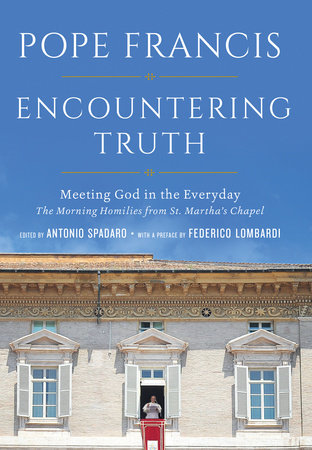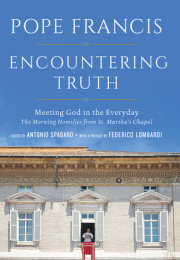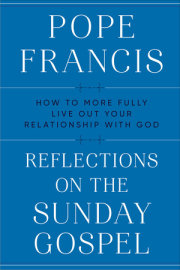1
God is patient with our weaknesses
During Holy Week, let’s think about the patience that God has with each of us.
God’s infinite patience with man is reflected in the infinite patience that Jesus has with Judas. This is shown in the scene of the Gospel in which Judas criticizes the decision of Mary, Lazarus’s sister, to anoint the feet of Jesus with three hundred grams of priceless ointment; it would have been better, Judas says, to have sold the ointment and given the proceeds to the poor. John notes in his Gospel that Judas was not interested in the poor but in the money, which he stole. And yet “Jesus did not say to him: ‘You are a thief.’
“He was patient with Judas, seeking to draw him to himself with his patience, with his love. It would do us good to think about the patience of God during this Holy Week, about the Lord’s patience with us, with our weaknesses, with our sins.”
The passage from Isaiah in the first reading, in presenting “the icon of that ‘servant of God,’ ” also emphasizes the meekness and patience of Jesus. Which is the patience of God himself. “When we think about the patience of God: that is a mystery! How patient he is with us! We do so many things, but he is patient.” He is “like that father in the Gospel who saw his son from far off, that son who had gone away with all the money of his inheritance.” And why did he see him from far away? “Because every day he went out to see if his son was coming back.” This “is the patience of God, this is the patience of Jesus.
“Let’s think about a personal relationship, during this week: what has the patience of Jesus meant in my life? Just this. And then only one thing will come from our hearts: ‘Thank you, Lord! Thank you for your patience.’ ”
March 25, 2013 Isaiah 42:1–7 John 12:1–11
2
The forgiveness of Jesus
Opening our hearts to the gentleness of God’s forgiveness: this is the theme of the homily for the Mass of Tuesday during Holy Week. Everyone lives through the “night of sin,” but Jesus has a “caress” for all.
“When Judas leaves the upper room to betray Jesus, outside--as the evangelist John states--it is night.” This remark on the setting leads to a brief reflection that urges us to plumb the depths of the human conscience. The night that envelops Judas is also the night in which his heart is stumbling about. It is the worst night, the “night of the corrupted,” a “definitive night, when the heart is closed” in such a way that “it cannot and does not want to come out” from itself. The “night of the sinner” is different; this is a “temporary” night that we all “experience.” How many of these nights “have we had,” how many “times when the ‘night’ comes and it is pitch black in the heart . . .” Then hope bursts through and drives us to a new encounter with Jesus. “We are not afraid of this night of the sinner. The most beautiful thing is to speak the name of the sin” in confessing it, and thus have the experience of Saint Paul, who affirmed that “his glory was Christ crucified in his sins. Why? Because in his sins he found Christ crucified, who forgave him.”
The reality of forgiveness, “tasting the sweetness of forgiveness,” is the second theme of the homily. “In the middle of the ‘night,’ of the many ‘nights,’ the many sins that we commit, because we are sinners, there is always that caress of the Lord” that makes us say: “This is my glory. I am a poor sinner, but you are my Savior!” Recalling the gaze with which Jesus forgave Peter after his denial, the invitation is to “open our hearts and taste the sweetness of forgiveness. Let’s think about how wonderful it is to be holy, but also how wonderful it is to be forgiven. Let’s trust in this encounter with Jesus” and “in the sweetness of his forgiveness.”
March 26, 2013 Isaiah 49:1–6 John 13:21–33, 36–38
3
Those who bad-mouth others are like Judas
The betrayal of Jesus is compared with gossip, with speaking ill of others. This is the reflection on the Gospel that presents the betrayal of Judas for thirty denarii. One of the Twelve, one of Jesus’ friends, one of those closest to him speaks with the leaders of the priests, negotiating the price of the betrayal. “Jesus is like a piece of merchandise: he is sold.
“This happens so many times in the marketplace of history as well . . . in the marketplace of our lives when we choose the thirty denarii and leave Jesus aside, we look at the Lord we have sold. And sometimes with our brothers, with our friends, with each other, we do almost the same thing.”
This happens “when we gossip about each other.” This is selling, and “the person about whom we are gossiping is a piece of merchandise, he becomes merchandise. And how easy it is for us to do this! It is the same thing that Judas did. I don’t know why, but there is a dark enjoyment in gossiping.” Sometimes we begin with good comments, but then suddenly we come to gossip and begin to “bad-mouth the other.” But “every time we gossip, every time we ‘bad-mouth’ the other we are doing the same thing that Judas did.” This, then, is the invitation: “Never speak ill of other persons.” When he betrayed Jesus, Judas “had his heart closed, he had no understanding, no love, no friendship.” So when we gossip we too have no love, no friendship, everything becomes merchandise: “We sell our friends, our relatives.
“Let’s ask for forgiveness because when we do this to a friend, we do it to Jesus, because Jesus is in this friend. And let’s ask for the grace not to ‘bad-mouth’ anyone, not to gossip about anyone.”
And if we realize that someone has shortcomings, let’s not get justice with our tongues, but let’s pray to the Lord for him, saying “Lord, help him!”
March 27, 2013 Isaiah 50:4–9a Matthew 26:14–25
4
Asking for the grace of tears to see the Risen Christ
The Gospel presented by the liturgy for the Tuesday of the Octave of Easter speaks to us of the encounter of the Risen Christ with Mary Magdalene. The scene is the one recounted by the Gospel according to John: the Magdalene is weeping at the tomb because the body of the Teacher is not there anymore. Mary Magdalene is that “sinful woman” who “anointed the feet of Jesus and dried them with her hair,” a “woman exploited and also despised by those who believed they themselves were righteous.” But she is also the woman “of whom Jesus said that she loved much and because of this her many sins were forgiven her.” Nonetheless, this woman had to “face the failure of all her hopes.” Jesus, “her love, is not there anymore, and she weeps. It is the dark moment of her soul: the moment of failure.” And yet she does not say: “I have failed on this path.” Instead “she simply weeps. At times in our life the glasses for seeing Jesus are tears.” Now the Magdalene proclaims this message: “I have seen the Lord.” She had seen him during his life, and now she bears witness to him: “An example for the journey of our life. All of us, in our lives, have felt joy, sadness, pain.
“In our darkest moments, have we wept? Have we had the gift of tears that prepare our eyes to look, to see the Lord?”
In the face of the Magdalene who is weeping “we too can ask the Lord for the grace of tears. It is a beautiful grace . . . to weep for everything: for the good, for our sins, for graces, even for joy. Weeping prepares us to see Jesus.” And the Lord gives all of us the grace to be able to say with our lives: “I have seen the Lord,” not because he has appeared to me, but because “I have seen him inside my heart.” And this is the witness of our lives: “I live like this because I have seen the Lord.”
April 2, 2013 Acts 2:36–41 John 20:11–18
5
Complaining is bad for the heart
The Gospel for the Wednesday of the Octave of Easter shows the two disciples of Emmaus leaving Jerusalem after the death of the Teacher. “They were afraid,” all the disciples were afraid. But along the road they kept talking about the things they had just experienced “and they were complaining.” They wouldn’t stop complaining, “and the more they complained, the more they were closed off in themselves; they had no horizon, just a wall in front of them.” After so much hope, they felt the failure of everything in which they had believed:
“And they were cooking--so to speak--they were cooking their lives in the broth of their complaints, and they were going on and on with their complaints. I think so many times that when difficult things happen to us, even when we are visited by the Cross, we run this risk of closing ourselves off in complaints. And even in this moment the Lord is close to us, but we do not recognize him. And he is walking with us. But we do not recognize him.”
And even if Jesus speaks to us and we feel wonderful things, deep down inside of us we continue to be afraid: it seems “safer to complain! It is like a form of security: this is my truth, failure. There is no more hope.”
It is wonderful to see Jesus’ patience with the two disciples of Emmaus.
“First he listens to them, then he explains to them slowly, slowly . . . And then, in the end, he shows himself. As he did with the Magdalene, at the tomb, Jesus does the same thing with us. Even in the darkest moments he is always with us, he walks with us. And in the end he lets us see his presence.
“Complaints are bad,” not only those against others, but also those against ourselves, when everything seems bitter to us. “They are bad because they take away our hope. Let’s not get into this game of living in complaints,” but if something is not right let’s take refuge in the Lord, confiding in him.
“Let’s not eat complaints, because these take away hope, they take away the horizon and close us off behind a wall. And there’s no getting out. But the Lord is patient and knows how to get us out of this situation.”
As happened for the disciples of Emmaus, who recognized him when he broke the bread.
“Let’s have trust in the Lord, he always accompanies us on our journey, even in the darkest hours. The Lord never abandons us: he is always with us, even in the difficult moments. And let’s not look for refuge in complaints; they’re bad for us. They’re bad for the heart.”
April 3, 2013 Acts 3:1–10 Luke 24:13–35
6
The amazement of the encounter with Christ generates true peace
The readings for the Thursday of the Octave of Easter speak to us of amazement: the amazement of the crowd over the healing of the crippled man performed by Peter in the name of Christ, and the amazement of the disciples at the appearance of the Risen Jesus.
“Amazement is a great grace, it is the grace that God gives us in the encounter with Jesus Christ. It is something that makes us lose our heads a bit out of joy . . . It is not mere enthusiasm,” like that of sports fans “when their team wins,” but “it is something deeper.” It is the interior experience of encountering the living Jesus and thinking that this is not possible: “But the Lord helps us to understand that it is reality. It is wonderful!
“Perhaps the opposite experience is more common, when human weakness, mental illness, or the devil makes people believe that phantasms and fantasies are the reality; this is not of God. What is of God is this joy that is so great it is beyond belief. And we think: No, this is not real! But it is. This is of the Lord. This astonishment is the beginning of the habitual state of the Christian.”
Of course, “we cannot always live in amazement. No, of course not. But it is the beginning. Then this amazement leaves its mark on the soul, and spiritual consolation.” It is the consolation of one who has encountered Jesus Christ.
So after amazement there is spiritual consolation, and at the end, on “the last rung,” there is peace. “Even in the most painful trials the Christian need never lose the peace and presence of Jesus” and “with a bit of courage” can pray: “Lord, give me this grace that is the mark of the encounter with you: spiritual consolation and peace.” A peace that cannot be lost, because “it is not ours,” it belongs to the Lord. True peace “cannot be bought or sold. It is a gift of God,” and therefore “let us ask for the grace of spiritual consolation and spiritual peace, which begin with this joyful amazement in the encounter with Jesus Christ.”
April 4, 2013 Acts 3:11–26 Luke 24:35–48
7
We are not saved by wizards, psychics, or ourselves
The readings for Friday of the Octave of Easter remind us with Saint Peter that it is only in the name of Jesus that we are saved: “There is salvation in no one else.” Peter, who had denied Jesus, now with courage, in prison, gives his testimony in front of the Jewish leaders, explaining that it is through the invocation of the name of Jesus that a crippled man has been healed. It is “that name which saves us”; Peter does not pronounce that name on his own, but “filled with the Holy Spirit.
“We cannot confess Jesus, we cannot speak of Jesus, we cannot say anything about Jesus without the Holy Spirit. It is the Spirit who urges us to confess Jesus or speak of Jesus or trust in Jesus. Jesus, who is on our journey of life, always. There was a man who worked in the chancery of Buenos Aires, a humble man, he had been working there for thirty years, the father of eight children. Before going out, before going to do his thing, he always said: ‘Jesus’ and one time I asked him: ‘Why do you always say “Jesus”?’ ‘Well . . . When I say “Jesus,” this man told me, ‘I feel strong, I feel like I can work, and I know that he is beside me, that he’s taking care of me.’ This man never studied theology, he had only the grace of Baptism and the power of the Spirit. And this testimony did me so much good.”
Because it reminds us that “in this world that offers us so many saviors” it is only the name of Jesus that saves. So many go to psychics or sorcerers to resolve their problems. But only Jesus saves, “and we must give witness to this! He is the only one.”
Finally, the invitation is to stay with Mary: “The Blessed Mother always takes us to Jesus,” as she did in Cana when she said: “Do whatever he tells you.” And so, entrusting ourselves to the name of Jesus, let’s invoke the name of Jesus, allowing the Holy Spirit to urge us “to make this trustful prayer in the name of Jesus . . . It will do us good!”
April 5, 2013 Acts 4:1–12 John 21:1–14
Copyright © 2015 by Pope Francis. All rights reserved. No part of this excerpt may be reproduced or reprinted without permission in writing from the publisher.















